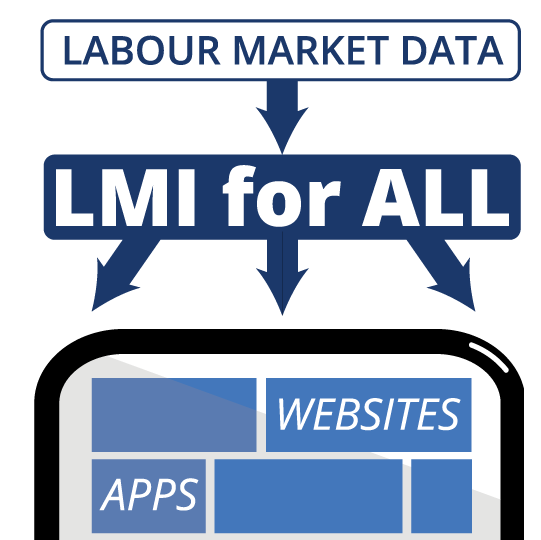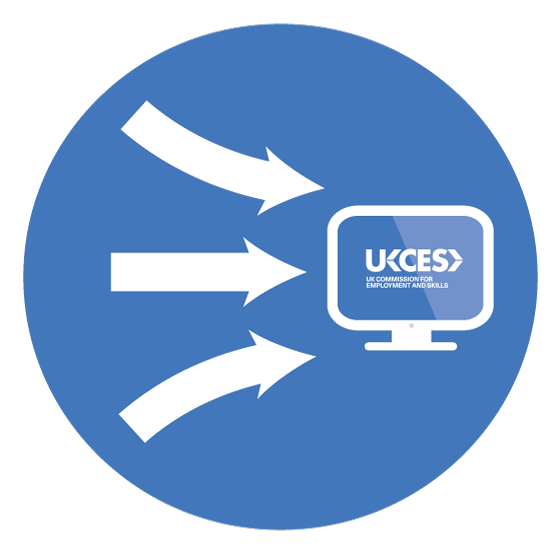About LMI For All
LMI for All is an online data portal funded by the Department for Education. It brings together existing national sources of high quality labour market information (LMI) that can inform people’s choices about their careers. LMI for All includes information from key datasets from, for example, the Office for National Statistics (ONS), the Department for Education and HESA.
LMI for All makes data freely accessible via a single access point. In this form, the data would not make much sense to end-users; the intention is for software developers to extract the labour market data, and use it to create informative and engaging apps, widgets or websites. We find that the data are most effective and useful when presented alongside qualitative information, such as descriptive and explanatory text or videos.
At heart this is an open data project, which supports the wider government agenda to encourage use and re-use of government data sets. It allows creative, talented developers to access data and gives them the opportunity to produce useful, visually striking apps, bringing the data to life for varying audiences, including individuals, careers practitioners, employers and policy makers. The data within LMI for All are all available under an open government license. This means that individuals and organisations are welcome to use the data for any purpose, including commercial use.




What LMI sources are included?
The LMI for All database includes data that can answer the questions people commonly ask when thinking about their careers, including ‘how much do people get paid?’, ‘will there be jobs in this field when I finish studying?’ and ‘what type of person does that job?’. The LMI for All service through its freely accessible API includes information from the Annual Survey of Hours and Earnings, the Labour Force Survey, the Employer Skills Survey, Working Futures and the UK Census of the Population. LMI for All also includes some vacancy data from the Department for Work and Pensions ‘FindaJob’ service, as well as data on interests, knowledge, skills and abilities from the US O*Net system which has been mapped to the UK Standard Occupational Classification (SOC).
The data available from LMI for All are organised around the ONS Standard Occupational Classification. This system classifies all jobs into 369 detailed categories, according to the tasks that are undertaken and the level and nature of the skills and qualifications required to do the job. More information on the data can be found here.

Who is using LMI for All?
Some examples of who is using LMI for All include:
- iCould is a careers website which uses LMI for All to provide context alongside careers videos.
- BBC Bitesize – Careers is part of the BBC website aimed at young people, which uses LMI for All data alongside other careers information in its job profiles.
- U-Explore provides careers guidance solutions for schools and colleges using LMI for All in its Start programme.
- Career Pathways is a widget that uses LMI for All alongside other data to help young people explore how their qualifications links to careers.
- SACU is an online source of careers information for young people, parents, teachers and careers advisers.
You can find more examples of how LMI for All is used here.


How has LMI for All developed?
The Institute of Employment Research at the University of Warwick with Pontydysgu were commissioned by UKCES in 2012 to develop the LMI for All pilot and test its feasibility. After successfully completing its pilot stage, LMI for All was given full project status. LMI for All also went through a process of testing in a series of hack days. Since then it has continued to be developed and updated. It has gone through a process of development with significant enhancements to the database and the technical infrastructure. To find out more about the development have a look at the reports produced documenting the process:
- 2012 Summary report on feasibility study
- 2012-15 Report of development process
- 2015-16 Report on data, technical and stakeholder activities
- 2018 Report on Labour market information for all: stakeholder engagement and usage, data and technical developments, documenting work and activities undertaken in 2016-2017
- Labour market information (LMI) for All 2017 to 2018
- Developing and enhancing a labour market information database: LMI for All Stakeholder Engagement and Usage, Data and Technical Developments (2018-2019)
In 2013, the CareerHack contest was organised by the UK Commission for Employment and Skills (UKCES). It challenged developers around the globe to build an app based on the LMI for All data. To find out more about the CareerHack competition and the winners.
In 2016, the team organised a symposium with the aim of increasing awareness about LMI for All and introducing some of our third party users. More information on the LMI for All Symposium held in 2016 is available.
This video was filmed at a half day symposium held on 1 December 2016 to showcase how LMI is being used; to share best practice; and promote new developments to the service, which can benefit current and future users.
What is next for LMI for All?
Since 2015 when LMI for All received the go-ahead to enter a full project phase, the team have been working with the remit to update the database, engage more stakeholders and expand LMI for All’s reach. Work on LMI for All is continuing with funding from the Department for Education and we are currently looking at ways to expand the database. The LMI for All service is funded by the Department for Education. Some of our upcoming work includes:
- Developing a second widget building on what we have learnt from Careerometer – Skillsometer has now been released.
- Developing a mapping from the new apprenticeship frameworks to SOC – to be released shortly.
- Updating our datasets including the Working Futures occupational projections – this is now available through the LMI for All API
- Producing some online LMI learning units – these LMI units are now available to use, but will be extending
- New course dataset – coming online soon
- Pilot vacancy dataset – coming soon and to be refined over the next few months to determine feasibility
- Preparing for changes to the UK standard occupational classification (its a big job!)
